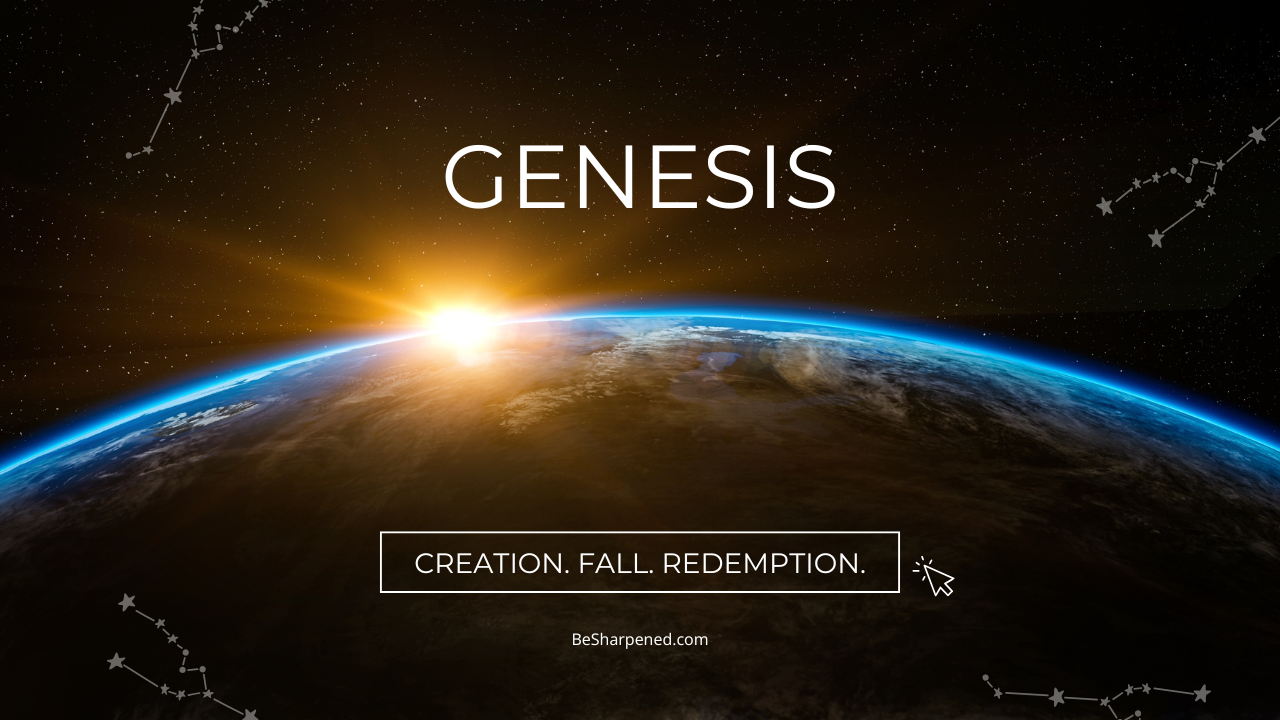Overview of the Book of Genesis
The Book of Genesis is the first book of the Bible and the Old Testament. It marks the beginning of Scripture and introduces the foundational truths of the Christian faith: the origin of the universe, the purpose of humanity, the entrance of sin, and the plan of redemption.
Genesis is part of the Pentateuch (the first five books of Moses) and serves as the introduction not only to the Bible’s grand narrative but also to the covenants and genealogies that shape the rest of redemptive history. The name “Genesis” means “origin” or “beginning,” a reflection of its contents.
In terms of theological importance, Genesis lays the groundwork for understanding who God is, what He requires of His creation, and how He initiates a relationship with humanity. It reveals God as Creator, Judge, and Covenant Maker. The book spans vast periods but zooms in on key individuals through whom God will fulfill His redemptive purposes, that is, Abraham, Isaac, Jacob, and Joseph.
Background to the Book of Genesis
Authorship and Date
Moses wrote Genesis under the inspiration of the Holy Spirit. He most likely compiled it during Israel’s wilderness journey after the exodus from Egypt, around the 15th or 13th century BCE, depending on one’s dating of the Exodus.
Historical Context
Genesis covers more history than any other book in the Bible, right from creation to the descent of Jacob’s family into Egypt. It is not written as a scientific textbook, but rather as a theological and historical record of how God initiated His redemptive work with humanity, particularly through the nation of Israel.
Structure of the Book of Genesis
Genesis is structured around major events that marked certain beginnings. These help outline the book’s progression from universal beginnings to the specific lineage of Israel.
Nevertheless, the book of Genesis is broadly divided into two main parts:
- Primeval History (Chapters 1–11): Creation to Babel
- Creation and Fall, Genesis 1:1-2:25 and 3:1-24 (The beginning of the heaven and earth, and the host of them, especially Man, and the beginning of sin)
- Multiplication of Man and Sin, Genesis 4:1-7:23 (The beginning of the multiplication of Man)
- Remultiplication of Man and the Nations, Genesis 7:24-11:32 (The beginning of the nations)
- Patriarchal History (Chapters 12–50): Abraham to Joseph (The beginning of the Nation of Israel)
Summary of Genesis
1. Creation and the Beginning of All Things (Genesis 1:1-2:25)
This section presents God as the sovereign Creator. The world is formed in six days, and humanity is made in God’s image. The structure is poetic and theological, showing God’s order, purpose, and goodness. The institution of marriage is also introduced as part of God’s design for human flourishing.
2. The Fall (Beginning) and the Spread of Sin (Genesis 3:1-6:8)
Human disobedience in Eden introduces sin, death, and separation from God. The consequences ripple through Cain and Abel’s story, leading to widespread corruption. Yet even in judgment, God provides grace coverings, a promise of redemption (Genesis 3:15), and protective marks.
3. Judgment and Preservation in the Flood (Genesis 6:9-9:29)
Noah is chosen as the righteous remnant in a world full of evil. God sends the Flood but preserves Noah and his family. Afterward, God establishes a covenant with Noah, promising never to destroy the earth by flood again, symbolized by the rainbow.
4. The Nations and the Tower of Babel (Genesis 10:1-11:26)
This section explains the origin of nations and languages, climaxing in human pride at Babel. God disperses the people, but His plan continues. The genealogy leads to Abram, through whom God will begin a new phase of redemptive history.
5. The Call and Covenant of Abraham (Genesis 11:27-25:18)
God calls Abram from Ur and makes a covenant with him, promising land, descendants, and blessing to the nations. Abraham’s faith is tested and ultimately rewarded. The section includes key episodes: the birth of Isaac, the offering at Moriah, and the beginnings of covenantal identity.
5.1. The Life of Isaac and the Blessing Passed On (Genesis 25:19-28:9)
Isaac’s story is shorter but crucial. It shows the continuation of the covenantal line. The rivalry between Jacob and Esau introduces the theme of God’s sovereign election. Rebekah plays a pivotal role in aligning with God’s word.
5.2. Jacob’s Journey and Transformation (Genesis 28:10-36:43)
Jacob flees, dreams at Bethel, marries, wrestles with God, and returns. He is transformed from a deceiver to the father of Israel. God reaffirms the covenant with him, and his twelve sons become the heads of the tribes of Israel.
5.3. Joseph: Providence in Suffering (Genesis 37:1-50:26)
Joseph’s story emphasizes God’s providence over human evil. Betrayed by his brothers, sold into slavery, and imprisoned, Joseph rises to power in Egypt. God uses him to preserve Jacob’s family, fulfilling His promise. Genesis ends with a hopeful vision of God’s sovereignty and provision.
Key Themes in the Book of Genesis
1. God
- Creator and Sustainer of all things
- Just Judge and Merciful Redeemer
- Covenant Maker who initiates the relationship with humanity
2. God’s Kingdom
- Begins with a garden and ends with a family that becomes a nation
- God’s sovereignty over creation and human history
- Foreshadowing of Christ through promises and typologies (e.g., Genesis 3:15, Melchizedek, Isaac)
3. Man vs. God’s Purpose
- The fall and its consequences
- Rebellion at Babel, disobedience in families
- Faithful responses (Abraham, Joseph) vs. resistance (Cain, Esau)
4. Family
- The family is the foundation of God’s covenantal promises
- Generational blessings and conflicts
- Marital patterns, sibling rivalry, and parental influence
5. Others
- Sin and its spread
- God’s providence in human suffering
- The importance of land and blessing
- The development of nations




